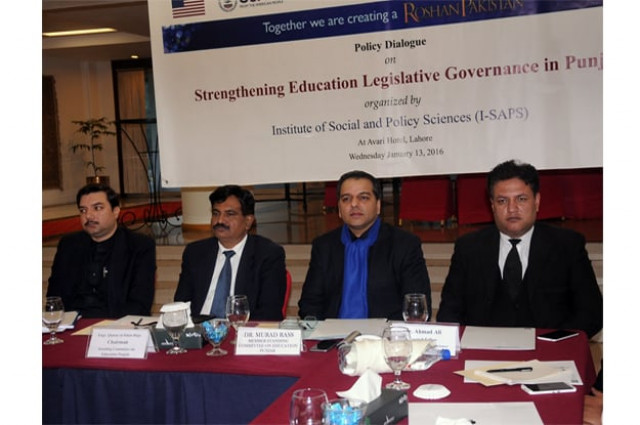Policy dialogue: ‘Weak political will hindering education goals’
Lawmakers, civil society members attend seminar on strengthening education legislation

Lawmakers, civil society members attend seminar on strengthening education legislation. PHOTO: EXPRESS
Several politicians, activists and reporters attended the Policy Dialogue on Strengthening Education Legislative Governance in Punjab, organised by the Institute of Social and Policy Sciences (I-SAPS).
MPA Dr Murad Raas, who is a member of the provincial assembly’s standing committee on education, said that the committee was working to deal with several challenges. “The standing committee on education is doing everything to address issues in the education sector. Although I am a member of the opposition, I do appreciate the role of the committee chairman,” he said. He said a lack of political will at the highest level was the real hurdle. “There is a need to further empower the committee and give it suo motu powers. So that it can make a difference,” he said.
Rass said that currently, a matter had to be referred to the standing committee by the speaker. “Because of this, the committee is unable to take up a matter on its own,” he said.
“Most of the time people compare the situation in Pakistan with developed nations. This makes things look bad. We should be comparing Pakistan with countries with similar resources and then judge ourselves and the improvements we are making,” he said.
Earlier, Hamid Masood, an I-SAPS research fellow, shared its report on the performance of standing committees, especially the standing committee on education. “According to our study, the Punjab has made significant improvement. In its current tenure, the standing committee has worked extensively. A total of 98 references were made to the committee,” he said.
He said public sessions were needed to engage citizens in the working of the committee. He said that standing committees also lacked input from experts and had no mechanisms in place to get research-based inputs. MPA Khurram Jehangir Wattoo, a standing committee on law and parliamentary affairs member, said that after the 18th Constitutional Amendment, education was the responsibility of the provinces. “The rules of procedure of the standing committees should be improved to enable them to perform their duties in a better way. There is a lack of infrastructure. There is a need to strengthen the capacity of the committees,” he said.
He said that standing committees had no support staff. “We are unable to gather information. Research-based decisions can only be taken if some information gathering infrastructure is available to the committees,” he said. Wattoo said that the media and civil society should help the committees.
MPA Qamarul Islam Raja, the standing committee on education chairman, acknowledged the lack of capacity.
Answering questions raised by the participants, he said that a private schools regulatory bill was being formulated. “Earlier, only an amendment was made to stop private schools from raising fees arbitrarily. A new bill will be presented soon to provide a mechanism to monitor private institutions in the province,” he said.
Raja said that local government representatives were being made members of the district education committees.
Published in The Express Tribune, January 14th, 2016.


















COMMENTS
Comments are moderated and generally will be posted if they are on-topic and not abusive.
For more information, please see our Comments FAQ